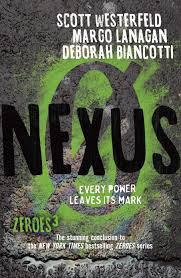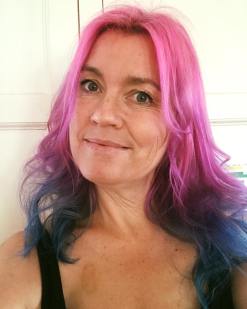 This book was sent to me by the publisher, Allen&Unwin, at no cost. It’s out today; RRP $19.99.
This book was sent to me by the publisher, Allen&Unwin, at no cost. It’s out today; RRP $19.99.
I enjoyed but wasn’t blown away by Zeroes; I was immensely more impressed by Swarm. With a few niggles about the haste with which this third book ended, I am basically very satisfied with how the trilogy concluded. It levelled up nicely, ramped up the consequences and problems being faced, complex-ified the characters… and it’s a very fast-paced read. Hugely enjoyable.
The basic premise, in case you’ve missed it: six kids in a little town in America, all born in 2000, have powers, of a sort. They’re all different powers and take varying degrees of control. None of the kids is really all that happy to have their powers. They end up working together basically because of Nate, or Bellwether, whose power is a persuasive one. So if you’re into superpowers and their consequences for individuals and families and communities, this should definitely be on your radar.
At the end of Swarm, there’s a dead Zero – who maybe needed to be dead, given what he was doing to everyone around him? – but the consequences of this need to be met. Nate takes the fall for it, rather than Thibault, and at the start of Nexus he’s in a supermax prison. The others break him out, and then they head to New Orleans because apparently something massive is going to happen courtesy of a Zero named Piper. Of course they end up entangled in it…
The first book took place in Cambria, a relatively small town. In the second, people from outside of Cambria bring more trouble to the town. Here, the Zeroes themselves are on the move, ending up in New Orleans at Mardi Gras. I liked this movement – there’s something metaphorical about growing up, in there. There’s also movement in terms of the Zeroes’ powers; the first book is really learning how to use them, the second much more about working together and learning some of the possibilities; here, they discover that there’s an inverse to how each has been using their power, as well as discovering yet more types of power.
One thing that has always bugged me about superhero stories – at least as I used to see them – is that there were no serious consequences for actions because “they’re the good guys”. But these three authors largely refuse to take that route. Thibault is so devastated by the fact that he killed someone – never mind that that someone was a killer himself – that it nearly destroys him. Kelsie is continually dealing with how close she came to being a Swarm. Chizara is tormented by the fact that she could kill someone by manipulating the electricity of their body. These are not easy situations to be in; they’re not comforted by being on the “right” side. They’re adolescents figuring out how to live in the world.
My one niggle, as mentioned above, is that the conclusion seemed to come around too quickly. There’s a huge amount of tension-building, and then it all seems to wrap up almost in an instant. Maybe that’s a reflection of me reading it too fast; maybe it’s the fact that the book ends about five minutes after the climax, with hints about the future but refusing to fully explore the consequences of frankly earth-shattering events. I have no problem with that refusal, just that I would have liked to see maybe the equivalent of that end-of-credits scene from Avengers, where they’re eating shwarma together… Also, the earth-shattering event itself wasn’t quite fully explained enough; I was left a bit confused by how or why it worked
All in all, though, I’m really pleased with this trilogy. The three authors seem to have worked well together – certainly their writing is seamless – and I love the variety of characters we’re given. I can only hope that we’re going to continue seeing books like this, and Gemina (with which it shares a definite something) in the YA scene.
Share this:- More





